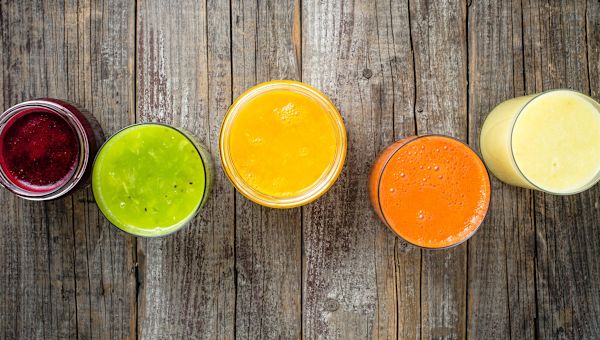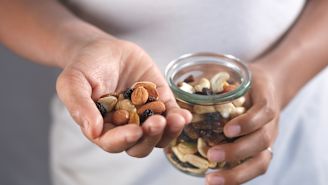6 tasty ways to eat more fruits and veggies
Pack more produce into your diet with these healthy and flavorful recipes.
Updated on January 30, 2026

Fruits and vegetables are an essential part of a healthy diet. Rife with vitamins, minerals, and fiber, they help your body function correctly and protect against disease. Among many benefits, eating plenty of produce is linked to a lower risk of heart disease, stroke, diabetes, and multiple cancers.
Most adults should eat about 2 cups of fruit each day, and at least 2 1/2 cups of vegetables, the American Heart Association advises. Sometimes, those goals can be difficult to reach. Fortunately, these simple, packed-with-produce recipes can help you get there.
Don’t forget: Before you prep, give your produce a good wash, says Frank Chae, MD, a bariatric surgeon with Sky Ridge Medical Center in Lone Tree, Colorado. To remove dirt and bacteria, he recommends placing your food in a colander and rinsing with water for three to five minutes.

Creamy guacamole dip
Made with avocado, corn, and onion, this dip can be paired with carrot and cucumber slices, scooped onto a turkey burger, or served with eggs and whole-wheat toast.
In a mixing bowl, mash one ripe avocado with:
- One-quarter of an onion, diced
- One clove of garlic, minced
- 1/4 cup of sweet corn
- One tomato, diced and seeded
Finish the dip with a generous squeeze of lime juice and a sprinkle of herbs and spices, such as fresh cilantro, salt, pepper, ground cumin, and cayenne pepper. If you like a bit of a kick, add some diced jalapeno.

Sweet and spicy slaw
Instead of using mayo to bind and flavor a slaw, Dr. Chae recommends adding lower-fat and lower-calorie ingredients, such as vinegar, pepper, and nonfat plain Greek yogurt.
Try this: Combine one head of shredded cabbage with two washed, peeled, and grated carrots and half of a white onion, sliced into thin strips. Mix in 1/2 cup of nonfat plain Greek yogurt, 2 tablespoons of apple cider vinegar, and generous sprinkles of salt, black pepper, and cayenne pepper. Top your slaw with a cup of grapefruit segments or pineapple slices. It should serve four people.
This recipe is rich with vitamin K for blood clotting and building bones, as well as vitamin C, which is essential for immune health, iron absorption, and much more.

Nutrient-rich smoothies
Quick to assemble and endlessly customizable, smoothies make for convenient and healthy meals on the go. When you’re assembling ingredients, be sure to maximize fruits and veggies and go easy on calorie-dense ingredients such as nut butters, as well as sweeteners like honey and sugar. Too many of these items can raise the calorie count significantly.
With that in mind, for a tropical, vitamin C-packed smoothie with just over 200 calories, pack your blender with pineapple, papaya, and kiwi. Slice a 1/2 cup of each and blend with a handful of ice and 1 cup of unsweetened almond milk.
Another option: Load your smoothie with veggies for an extra punch of nutrients such as folate, which promotes wound healing and DNA formation. Enjoy a green smoothie by blending half an avocado and 1 cup of unsweetened almond milk with 1/2 cup of each: cauliflower, pineapple, and cantaloupe.

Grilled fruit salad
Fruits are sweet because they contain natural sugars. Tossing them on the grill helps to concentrate those sugars and enhance the fruit’s flavor.
Skewer 1 cup of diced papaya, pineapple, mango, cantaloupe, and honeydew, and place them on a heated grill. Grill both sides. When your fruit begins to caramelize and deep grill marks appear, you’re ready to eat. Well, almost.
Slide the grilled fruit off the skewers and top with a yogurt dressing—1/2 cup of nonfat plain Greek yogurt, 1 tablespoon of lemon juice, and a drizzle of honey. One cup of this sweet salad contains around 100 calories.
If savory sides are more to your liking, toss corn or asparagus on the grill and whip up a warm salad.

Veggie tacos
Skip ground beef—which can be high in unhealthy saturated fat—and try a taco-style meal with veggies instead. Try grilling or sauteing mushrooms and red onions with your favorite taco seasonings. When your veggies are tender, add a heaping handful of sweet corn kernels to the mix. Then, place everything onto a bed of mixed greens, over a serving of brown rice, or inside a few taco shells.
Be mindful of your additions. Toppings like sour cream and full-fat cheese can quickly add on calories. Fresh salsa, however, is a zingy, low-calorie condiment, and avocado slices can provide heart-healthy monounsaturated fat.
“I think portion control is key,” says Dr. Chae. “It’s true, these are great foods and it's really difficult to get obese from eating them, but if you put unhealthy ingredients on top of them, it almost defeats the purpose of eating well.”

Nourishing Buddha bowls
Need a great way to use up leftover veggies? Try these picture-worthy bowls. Start by adding a 1/2 cup serving of cooked brown rice to a bowl with 1 cup of washed and chopped greens. Set it aside.
In a separate bowl, drizzle olive oil over 1 cup of your favorite veggies, like asparagus or mushrooms. Season well with salt, pepper, and other herbs. Give your bowl a Mediterranean kick, for example, by adding parsley, basil, oregano, thyme, and rosemary. Then, place the produce on a baking sheet and roast until tender.
For a dose of plant-based protein, add a 1/4 cup of chickpeas. For healthy fats? Pile on one-quarter of an avocado. Arrange your ingredients and dig in.

Harvard TH Chan School of Public Health. Vegetables and Fruits. Accessed May 15, 2025.
Better Health Channel (AUS). Fruit and vegetables. September 9, 2022.
Harvard TH Chan School of Public Health. Vitamin K. Accessed May 15, 2025.
NIH Office of Dietary Supplements. Vitamin C. March 22, 2021.
Utah State University Nutrition Extension. Smoothies—Helpful or Harmful? Accessed May 15, 2025.
VA.gov. Building a Balanced Smoothie. July 2019.
NIH Office of Dietary Supplements. Folate. November 21, 2022.
Harvard TH Chan School of Public Health. Avocados. Accessed May 15, 2025.
American Heart Association. How to Eat More Fruit and Vegetables. October 26, 2023.
More On


video

article

slideshow


video


video
